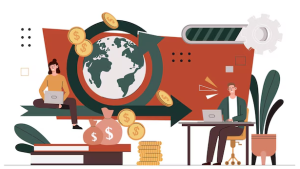Financial education plays a crucial role in bridging the economic divide that persists in the United States. By equipping individuals with the knowledge and skills needed to manage their finances effectively, we can create a more equitable society. This blog post explores how improving financial literacy can help reduce income disparities and promote economic well-being for everyone.
Let’s dive into the different aspects of financial empowerment and understand how they contribute to diminishing economic imbalances. Each section will shed light on the significance of financial acumen and its impact on various socio-economic factors.
The importance of financial literacy

Understanding the fundamentals of financial matters is essential for making informed decisions. Without a solid grasp of finance, people are more likely to fall into debt, miss out on investment opportunities, and be unprepared for emergencies. Basic financial concepts like budgeting, saving, investing, and credit management can significantly influence one’s economic stability and growth.
In a country where the cost of living rises steadily, mastering these principles is more important than ever. Financial literacy not only helps individuals manage their personal funds more effectively but also fosters a more resilient and prosperous economy on a broader scale. Moreover, financial education empowers individuals from all backgrounds to overcome economic hurdles.
The impact of financial education on low-income communities
Educational initiatives tailored to enhance financial knowledge in underprivileged areas can create long-lasting positive effects. Often, lower-income households have less access to resources that can improve their financial stability.
By providing targeted financial literacy programs, we can help these communities break the cycle of poverty. These educational efforts can include workshops on money management, savings plans, and how to navigate financial institutions effectively.
When people understand how to handle their finances and make strategic decisions, they’re more likely to build wealth over time. Success stories from communities that have benefited from such programs serve as a testament to the transformative power of financial education. These initiatives demonstrate that knowledge truly is power when it comes to economic mobility.
The role of schools in promoting financial literacy
Integrating personal finance courses in school curricula is an effective way to impart essential financial skills to young individuals. By starting financial education early, we set the groundwork for future generations to make better financial choices.
Schools play a pivotal role in shaping the financial habits and perspectives of students. Financial literacy programs can be incorporated into existing subjects or offered as standalone courses, providing students with the tools needed to navigate their financial futures confidently.
Educators can make these lessons engaging and applicable to real-life scenarios, ensuring that students not only learn but also apply critical financial concepts. Early exposure to these principles can foster a culture of financial responsibility and awareness among young adults.
Policy and corporate responsibility in financial education
Government policies and corporate initiatives can significantly influence the dissemination and impact of financial literacy programs. Support from these entities can ensure that financial education is accessible and effective across diverse demographics.
Public policies that mandate financial literacy in educational systems can guarantee that everyone receives a basic level of financial education. Additionally, partnerships between private enterprises and community organizations can enhance the reach and quality of these initiatives.
Corporations can also contribute by offering employee financial wellness programs. These initiatives help employees manage their finances better, leading to a more satisfied and productive workforce. Corporate responsibility in this area also helps build a more inclusive and equitable economy.
Effective public policy strategies
One effective strategy is to incorporate financial literacy into the national curriculum, ensuring that students across all states receive standardized financial education. This approach can help bridge the knowledge gap and promote economic equality from a young age. Another strategy involves incentivizing community organizations to develop and deliver financial literacy programs tailored to their specific audiences.
This localized approach ensures that the content is relevant and impactful for different community needs. Lastly, creating public awareness campaigns about the importance of financial literacy can encourage more individuals to seek out financial education programs, furthering the goal of economic equality.
Corporate initiatives in financial literacy
Many companies are recognizing the benefits of fostering financial well-being among their employees. Employee financial wellness programs are becoming increasingly popular as they help reduce financial stress and increase productivity and loyalty.
These programs can include workshops, one-on-one financial counseling, and digital resources. By providing these tools, companies empower their employees to make better financial decisions, which can lead to a more stable and motivated workforce.
Corporate initiatives in financial literacy demonstrate a commitment to social responsibility and contribute to a more balanced economic landscape. When companies invest in their employees’ financial health, they also invest in the broader community’s economic stability.
